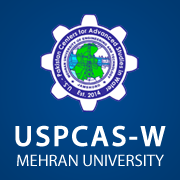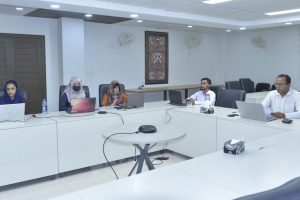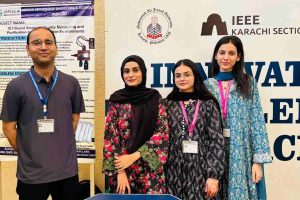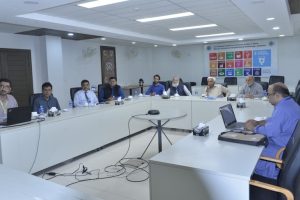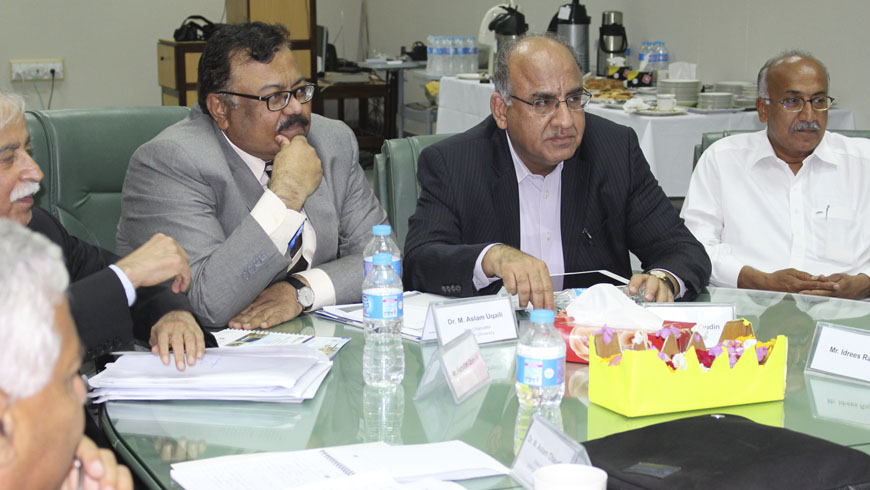
Applied Research overcome Water Challenges of Pakistan, say water experts
Water Experts say Pakistan needs water reservoirs, water policy and action research to form framework of actions to combat water crisis and challenges, this they said in the meeting on Water Resources Challenges of Pakistan held in main library at Mehran University of Engineering and Technology (MUET) Jamshoro, organized by U.S.-Pakistan Center for Advanced Studies in Water (USPCAS-W) today. Former Secretary Irrigation and Water Expert Muhammad Idris Rajput while delivering his presentation on “Inter-Provincial Water Issues of Pakistan” said that Inter-provincial water disputes between Sindh and Punjab dates back to British Rule when new canals, barrages and dams were planned, constructed or envisioned. He said that various commissions and committees were formed to resolve the water dispute but failed since Anderson Committee 135 to Haleem Commission in 1983. He pointed out three main reasons of the dispute including shortage of water, injustice in distribution and fear of future impact. Mr. Rajput said that upper riparian always being benefited in distribution of water at the cost of their counterpart of lower riparian due to various reasons.
He said that Water Accord of 1991 was signed unanimously but the dispute between the provinces is still persisting since its implementations. He further said that since the storage capacity of Tarbela and Mangla dams were reduced 29% and 15% respectively, the replacement dam could be viable to store surplus water. Former Federal Secretary Planning and Development Expert Fazullah Qureshi presented statistical information on Water Governance and Institutional Performance. Mr. Qureshi said that agricultural use of water in Pakistan is very much high as compared to its productivity and there is no relationship found between cultivation of crops and collection of revenues particularly in Sindh. He suggested that improved governance, better agriculture extension practices, better public services, proper water charges and accountability in every sphere can pave the way for better water governance and its productive use. Dr. Mohammad Aslam Chaudhary from University of Utah, United States said that through the framework of actions the water challenges of Pakistan can be overcome. He said that USPCAS-W will initiate to collect data and serve as clearinghouse on water related problems in Pakistan. Dr. Chaudhry said that water problems of Pakistan should be prioritized as the applied and action research can be done accordingly.
Dr. Mujeeb-uddin Memon, Vice Chancellor Sindh Agriculture University Tandojam moderated the meeting while Dr. Mohammad Aslam Uqaili, Vice Chancellor MUET in his conclusion remarks said that academia, civil society and water research center have to work in collaboration for the solution of water challenges faced by Pakistan today. He said that applied research that will be transformed into policy which will improve water governance of the country. Council for Research and Policy was formed on this occasion that will work as a think tank of this water research center. Project Director Dr. Bakhshal Khan Lashari welcomed all the participants and briefed about USPCAS-W – a USAID funded water research center of MUET. Babar Effendi Managing Director Sindh Irrigation and Drainage Authority (SIDA), Nazir Ahmed Essani General Manager SIDA, Irshad Bohio, General Manager WAPDA, Zarif Khero Superintending Engineer Chotiari Reservoir Sanghar, Prof. Dr. Suleman Qazi, Dr. Fateh Mari, Project Coordinator Water Sector Improvement Project (WSIP), Dr. G.B. Khaskheli Dean MUET, Prof. Mushtaq Mirani, Civil Society Activist, Mr. Mehmood Nawaz Shah, Vice President Sindh Abadgar Board, Mr. Jamaluddin Manghan , Project Director WSIP, Mr. Fazulluddin Nizamani, growers representative, faculty members of USPCAS-W and other participated in the meeting.

